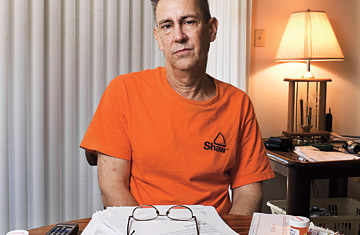
Patrick Tumulty with his medication and his bills.
When you've been strong and fit your whole life, it can be easy to discount your body's first whispers of sickness as merely the side effects of daily living. Looking back over the past three years, my older brother Patrick now understands the meaning of his increasingly frequent bouts of fatigue, his fluctuating appetite and the fact that his blood pressure had crept up to 150/90. But Pat had always put off going to the doctor until he had to. Having bought health insurance that carried a $2,500 deductible, he knew he would have to pay for a checkup himself. That is no small consideration for someone who makes $9 an hour, as my brother did in his job as an administrative assistant for a lighting firm in San Antonio. He also struggles with Asperger's syndrome, a disorder sometimes described as high-functioning autism. Pat can multiply three-digit numbers in his head with ease, but he has trouble accepting the unfamiliar and adjusting to the unforeseen.
The unforeseen was exactly what turned up when Pat went in for a physical on Nov. 30, 2007, his first in five years. The doctor found high levels of blood and protein in his urine, results that were confirmed in another round of tests in December. Soon after that, Pat discovered that his urine had turned brown and foamy. In the middle of all this, he was laid off from his job, and finding a new one while doing temp work was his most pressing concern. Finally, last July my brother's doctor insisted that he see a specialist, who quickly ordered a biopsy. That's when Pat, who is now 54, learned that his kidneys were failing.
The diagnosis was only the first shock. The second came a few weeks later, in an Aug. 5 letter from Pat's health-insurance company. For six years--since losing the last job he had that provided medical coverage--Pat had been faithfully paying premiums to Assurant Health, buying a series of six-month medical policies, one after the other, always hoping he would soon find a job that would include health coverage. Until that happened, "unexpected illnesses and accidents happen every day, and the resulting medical bills can be disastrous," Assurant's website warned. "Safeguard your financial future with Short Term Medical temporary insurance. It provides the peace of mind and health care access you need at a price you can afford."
Kidney failure would seem to be one of those disastrous "unexpected illnesses" that Pat thought he was insuring himself against. But apparently he was wrong. When my mother, panicked, called to tell me that the insurance company was refusing to pay Pat's claims, I told her not to worry; bureaucratic mix-up, I assumed. I said I'd take care of it, bringing to bear my 15 years of experience covering health policy, sitting through endless congressional hearings on the subject and even moderating a presidential candidates' forum on the issue.
Confident of my abilities to sort this out or at least find the right person to fix the problem, I made some calls to the company. I got nowhere. That's when I realized that the national crisis I'd written so much about had just hit home.
The previous four weeks had left my brother with more than $14,000 in bills from hospitals, doctors and labs. And that was just to figure out what was wrong with him. Actually treating his disease was going to be unimaginably more expensive. Patrick needed help quickly, and we didn't have a clue where or how to start looking for it.
